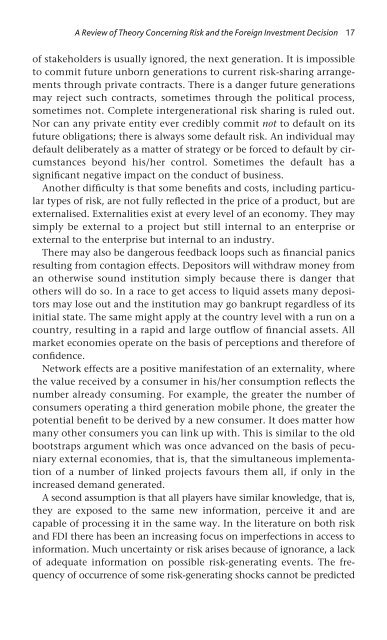Risk and Foreign Direct Investment - Index of
Risk and Foreign Direct Investment - Index of
Risk and Foreign Direct Investment - Index of
You also want an ePaper? Increase the reach of your titles
YUMPU automatically turns print PDFs into web optimized ePapers that Google loves.
A Review <strong>of</strong> Theory Concerning <strong>Risk</strong> <strong>and</strong> the <strong>Foreign</strong> <strong>Investment</strong> Decision 17<br />
<strong>of</strong> stakeholders is usually ignored, the next generation. It is impossible<br />
to commit future unborn generations to current risk-sharing arrangements<br />
through private contracts. There is a danger future generations<br />
may reject such contracts, sometimes through the political process,<br />
sometimes not. Complete intergenerational risk sharing is ruled out.<br />
Nor can any private entity ever credibly commit not to default on its<br />
future obligations; there is always some default risk. An individual may<br />
default deliberately as a matter <strong>of</strong> strategy or be forced to default by circumstances<br />
beyond his/her control. Sometimes the default has a<br />
significant negative impact on the conduct <strong>of</strong> business.<br />
Another difficulty is that some benefits <strong>and</strong> costs, including particular<br />
types <strong>of</strong> risk, are not fully reflected in the price <strong>of</strong> a product, but are<br />
externalised. Externalities exist at every level <strong>of</strong> an economy. They may<br />
simply be external to a project but still internal to an enterprise or<br />
external to the enterprise but internal to an industry.<br />
There may also be dangerous feedback loops such as financial panics<br />
resulting from contagion effects. Depositors will withdraw money from<br />
an otherwise sound institution simply because there is danger that<br />
others will do so. In a race to get access to liquid assets many depositors<br />
may lose out <strong>and</strong> the institution may go bankrupt regardless <strong>of</strong> its<br />
initial state. The same might apply at the country level with a run on a<br />
country, resulting in a rapid <strong>and</strong> large outflow <strong>of</strong> financial assets. All<br />
market economies operate on the basis <strong>of</strong> perceptions <strong>and</strong> therefore <strong>of</strong><br />
confidence.<br />
Network effects are a positive manifestation <strong>of</strong> an externality, where<br />
the value received by a consumer in his/her consumption reflects the<br />
number already consuming. For example, the greater the number <strong>of</strong><br />
consumers operating a third generation mobile phone, the greater the<br />
potential benefit to be derived by a new consumer. It does matter how<br />
many other consumers you can link up with. This is similar to the old<br />
bootstraps argument which was once advanced on the basis <strong>of</strong> pecuniary<br />
external economies, that is, that the simultaneous implementation<br />
<strong>of</strong> a number <strong>of</strong> linked projects favours them all, if only in the<br />
increased dem<strong>and</strong> generated.<br />
A second assumption is that all players have similar knowledge, that is,<br />
they are exposed to the same new information, perceive it <strong>and</strong> are<br />
capable <strong>of</strong> processing it in the same way. In the literature on both risk<br />
<strong>and</strong> FDI there has been an increasing focus on imperfections in access to<br />
information. Much uncertainty or risk arises because <strong>of</strong> ignorance, a lack<br />
<strong>of</strong> adequate information on possible risk-generating events. The frequency<br />
<strong>of</strong> occurrence <strong>of</strong> some risk-generating shocks cannot be predicted




